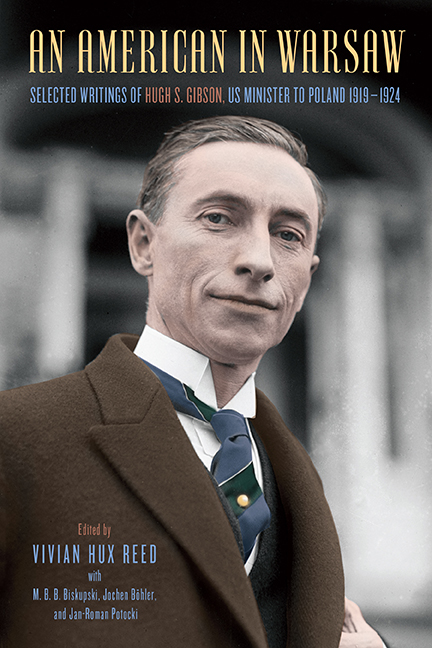Book contents
- Frontmatter
- Dedication
- Contents
- List of Illustrations
- Foreword
- A Few Things about My Father
- Acknowledgments
- Chronology
- Introduction
- 1 A New Observer in a New Poland: 1919
- 2 A Wild Ride: 1920
- 3 Aftermath and Rebuilding: 1921
- 4 A Wedding and a Funeral: 1922
- 5 Stabilization: 1923
- 6 Changes in the Wind: 1924
- Epilogue
- List of Publications by Hugh S. Gibson
- Rochester Studies in East and Central Europe
- Selected Bibliography
- Index
5 - Stabilization: 1923
Published online by Cambridge University Press: 09 June 2021
- Frontmatter
- Dedication
- Contents
- List of Illustrations
- Foreword
- A Few Things about My Father
- Acknowledgments
- Chronology
- Introduction
- 1 A New Observer in a New Poland: 1919
- 2 A Wild Ride: 1920
- 3 Aftermath and Rebuilding: 1921
- 4 A Wedding and a Funeral: 1922
- 5 Stabilization: 1923
- 6 Changes in the Wind: 1924
- Epilogue
- List of Publications by Hugh S. Gibson
- Rochester Studies in East and Central Europe
- Selected Bibliography
- Index
Summary
Weekly Political Report, No. 1476 [HIA]
Warsaw, January 4, 1923
… On Saturday, December 30, Professor Niewiadomski was tried for the murder of President Narutowicz. The accused made two long speeches in his own behalf which are interesting in showing an attitude toward public questions that may be considered fairly prevalent. On being asked if he pleaded guilty, Professor Niewiadomski said that he was not guilty but that he did acknowledge committing the murder and thereby breaking the law. He was afforded the opportunity to make a full statement in his own behalf and spoke for nearly an hour on the first occasion and for a somewhat shorter period the second time. In substance he said that he had originally planned to kill Marshal Piłsudski and not President Narutowicz; that he had conceived the idea when Marshal Piłsudski opened the road to anarchy by appointing the socialist leader Moraczewski as prime minister in 1918. Piłsudski could have given the country a strong and capable government at the time and could have set it on the right path. He preferred to serve party interests and the power placed in his hands by a trusting a nation was used for purely party interests. For this Marshal Piłsudski deserved death.
The accused spent some time reviewing in detail the political activities of Marshal Piłsudski. He discussed socialism in general and in its application to the Polish Republic, declaring that it might have originally had some pure ideals but that in Poland it had come under the influence of the Jews and had become the instrument of class hatred and subversive doctrine; that under the degrading influence of Marshal Piłsudski the Polish bureaucracy lent itself to Bolshevik machinations even during the advance of the Bolshevik armies in 1920.
Professor Niewiadomski went on to say that having led the country with incredible skill down the road to ruin, Marshal Piłsudski had relinquished the presidency into the hands of a man whom he knew would govern loosely and lead Poland still further down the road to the abyss. President Narutowicz, elected by the enemies of Poland, the national minorities, made up of Ukrainians, Jews and Germans, was the chosen instrument of Marshal Piłsudski, a man who has not the strength of character to refuse election by his country's enemies and one who thereby became the symbol of Poland's shame. As that symbol Professor Niewiadomski had felt called upon to kill him.
- Type
- Chapter
- Information
- An American in WarsawSelected Writings of Hugh S. Gibson, US Minister to Poland, 1919–1924, pp. 463 - 515Publisher: Boydell & BrewerPrint publication year: 2018



